To accompany your Come Follow Me study for February 17-23
In addition to reading these sections, you will want to look at the following resources this week:
- Chapter 7: Doctrine and Covenants 4; 11–12; 14–16 (churchofjesuschrist.org)
- Chapter 6: Doctrine and Covenants 7; 13; 18 (churchofjesuschrist.org)
- Chapter 4: Doctrine and Covenants 5; 17 (churchofjesuschrist.org)
- The Knight and Whitmer Families (churchofjesuschrist.org)
- Joseph Smith’s Revelations, Doctrine and Covenants 12 (churchofjesuschrist.org)
- Joseph Smith’s Revelations, Doctrine and Covenants 13 (churchofjesuschrist.org)
- Joseph Smith’s Revelations, Doctrine and Covenants 14 (churchofjesuschrist.org)
- Joseph Smith’s Revelations, Doctrine and Covenants 15 (churchofjesuschrist.org)
- Joseph Smith’s Revelations, Doctrine and Covenants 17 (churchofjesuschrist.org)
- “Restoration of the Aaronic Priesthood,” Church History Topics, at Restoration of the Aaronic Priesthood (churchofjesuschrist.org)
- Saints 1:65-68
“Priesthood Restoration Site” at https://history.churchofjesuschrist.org/subsection/historic-sites/pennsylvania/priesthood-restoration-site?lang=eng
Saints 1, chapter 7, at https://abn.churchofjesuschrist.org/study/history/saints-v1/07-fellow-servants?lang=eng
“Voices of the Restoration” in this week’s Come Follow Me material at https://abn.churchofjesuschrist.org/study/manual/come-follow-me-for-individuals-and-families-doctrine-and-covenants-2021/08?lang=eng
“The Experience of the Three Witnesses,” in Revelations in Context, at https://abn.churchofjesuschrist.org/study/manual/revelations-in-context/the-experience-of-the-three-witnesses?lang=eng
If you would like a Kahoot game related to this material that you can use with your family or class, click the following link: https://create.kahoot.it/share/doctrine-and-covenants-12-17-and-js-h-1-66-75/e6010134-68b5-4024-b0bf-9f11cae04b4e. To use it with a group, after clicking on this link, you will need to log into Kahoot, creating a free account if you have not done so previously, then click on the blue “Host Live” button or the gray “Assign” button, depending on how you wish to use the Kahoot. Some of the Kahoot questions may presuppose that the player has read through the suggested answers to the following Points to Ponder and at least has browsed the Institute student manual as well.
Points to Ponder in Doctrine and Covenants 12-13 and Joseph Smith—History 1:66-75
1. What are the most significant things you learned about Joseph Knight in D&C 12 and in the related reading material above?
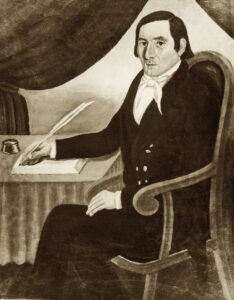
2. Why are parts of D&C 12 so similar to revelations given to others? Which parts are unique to this section?
3. What questions might a 12 year old boy about to be ordained to the Aaronic Priesthood have about what John the Baptist said in D&C 13? What answers would you give him?
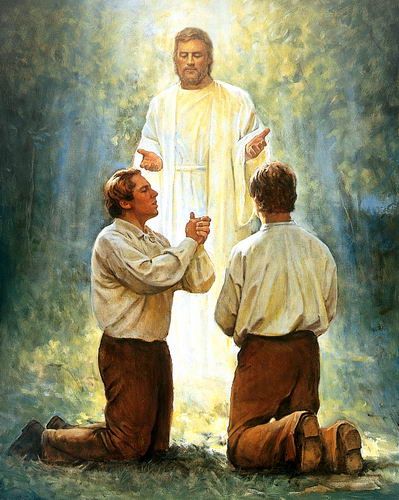
4. Why, after John the Baptist had already ordained both of them, did Joseph Smith and Oliver Cowdery ordain each other all over again?
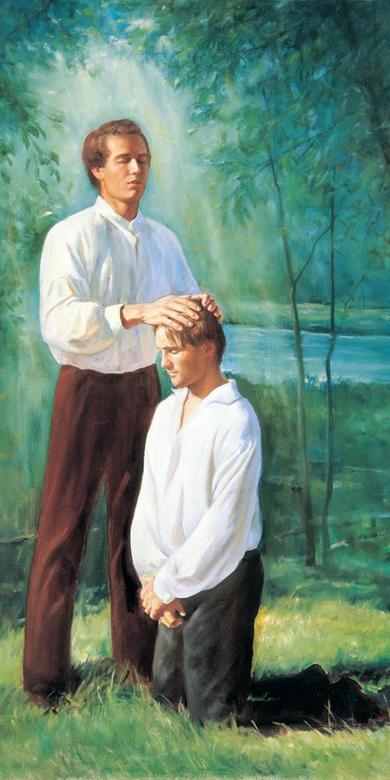
5. What significance do you see in the differences between Joseph Smith’s and Oliver Cowdery’s accounts of the words of John the Baptist on the occasion of the restoration of the Aaronic Priesthood?
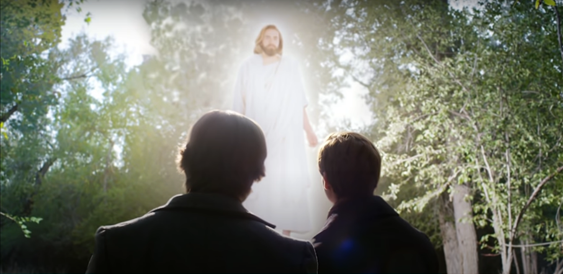
6. What do you consider the most interesting, inspiring, and significant additional details you found in your reading of the recommended additional sources above and in the related videos?
7. Who were David, John, and Peter Whitmer, Jr., and why would they have been selected to receive sections 14-16 of the Doctrine and Covenants?
8. What does the Lord define as the greatest of all his prospective gifts to us, and where does he so define it? Why would He have singled that out as the greatest?
9. How do you explain sections 15 and 16 being identical except for the name of the recipient, when patriarchs today are cautioned to take care not to give identical blessings to two individuals? (This is similar to a question we considered in a previous week’s study, so consider it a review question.)
10. Why do you suppose the Lord chose Martin Harris, Oliver Cowdery, and David Whitmer as the Three Witnesses of the Book of Mormon rather than someone else? Why was the call of each particularly appropriate?
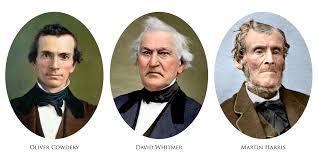
11. List four sacred artifacts the Three Witnesses saw in addition to the plates of the Book of Mormon.
12. What personal application can you see of the principle behind the fact that Oliver Cowdery and David Whitmer couldn’t see the angel or the plates until Martin Harris left?
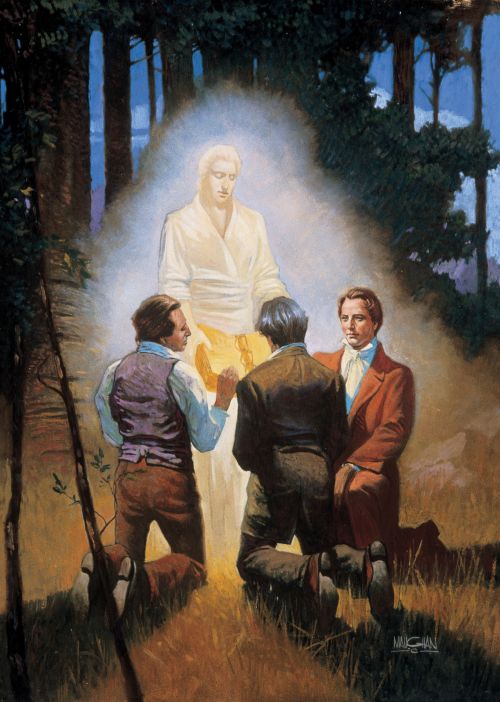
13. Why could it be argued that the testimony of the Three Witnesses is even more compelling because they left the Church than it would have been had they not done so?
14. What were the major differences between the experience of the Three Witnesses and that of the Eight Witnesses? What did each have that the other did not?
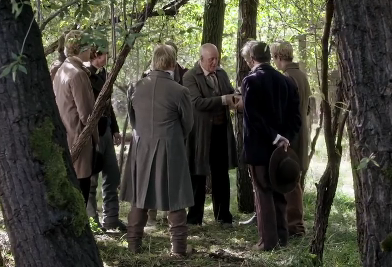
15. What effect would it likely have on the world’s attitude toward the Book of Mormon if Moroni had left the plates and other artifacts for Joseph Smith to display in a Church museum? Why do you think so?
Possible Answers to Points to Ponder in Doctrine and Covenants 12-13 and JS-H 1:66-75
1. What are the most significant things you learned about Joseph Knight in D&C 12 and in the related reading material above?
Joseph Knight was a prominent landowner in Colesville, New York. He employed young Joseph Smith to work for him and considered him the best hand he had ever hired. He and his family were the next after the Smith family to believe the testimony of Joseph Smith. Mr. Knight was present at the Smith home in Palmyra when Joseph returned from getting the plates from the Hill Cumorah and thereafter provided material help to him to enable the translation to proceed. His desire to know what the Lord wanted of him led to the reception of D&C 12.
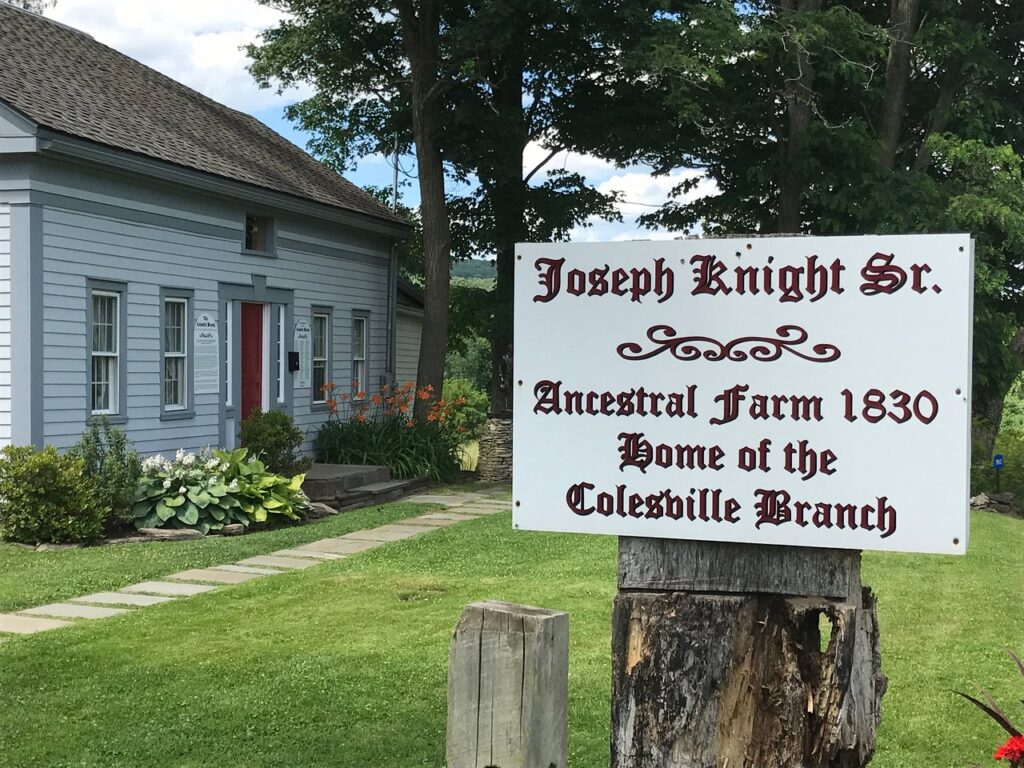
2. Why are parts of D&C 12 so similar to revelations given to others? Which parts are unique to this section?
Just as we would often send the same or a similar email to various members of our family, so can the Lord choose to bless several of His children with the same perfectly good and applicable revealed language. In many ways, our circumstances and needs are more similar than they are different. In this case, sections 4, 6, 11, and 14 all contain wording very similar to that in section 12. Verses 7-9 seem to be those which are unique to this section.
3. What questions might a 12 year old boy about to be ordained to the Aaronic Priesthood have about what John the Baptist said in D&C 13? What answers would you give him?
His questions could include:
- What does “in the name of Messiah” mean? (The Bible Dictionary tells us that “Messiah” comes from an Aramaic word meaning, “the anointed.” The Greek equivalent is “Christ.” So “in the name of Messiah” is just another way of saying, “in the name of Jesus Christ.”)
- What are “the keys of the ministering of angels”? (Church leaders have said comparatively little about what John the Baptist may have meant by this phrase. President Hinckley said he understood it to mean that a righteous Aaronic Priesthood holder had the right to the guidance, protection, and blessings of heavenly beings. See https://www.churchofjesuschrist.org/media/video/2012-05-8250-keys-of-the-ministering-of-angels?lang=eng. Church historian Steven L. Harper viewed it as having reference to the power to discern between righteous angels and demonic ones, as outlined in D&C 128:20 and D&C 129.)
- Who are the “sons of Levi” and what is the offering they are to make? (The tribe of Levi anciently were the ones who held the priesthood and officiated in priesthood ordinances. Church leaders and scriptures suggest there is both a literal and a figurative fulfillment of Malachi’s prophecy that the sons of Levi in the latter days would offer an acceptable offering, which they seldom if ever did anciently due to apostasy. Joseph Fielding Smith understood that literal descendants of the tribe of Levi would eventually accept the gospel, receive the priesthood, and as part of the restoration of all things would at least once properly perform animal sacrifices before that ordinance was done away forever. D&C 84, 124, and 128, as well as 13, suggest that another meaning is that latter-day Church members would in one sense not only be considered adoptive Israelites and members of a tribe designated by their stake patriarch but would also be considered “sons of Moses and of Aaron,” or in other words, “sons of Levi,” and heirs of the Aaronic as well as Melchizedek priesthoods. And, in fulfilment of Malachi’s prophecy, they would present records of their dead in the temples and perform sacred ordinances there on their behalf. See: https://latterdaysaintmag.com/article-1-12356/.)
- Will the Aaronic Priesthood be taken from the earth once those sons of Levi offer the required offering unto the Lord in righteousness? (Robert J. Matthews, a BYU professor and gospel scholar, understood it this way: It is from the latter part that I think we can learn a little more. The Aaronic Priesthood is “never to be taken again from the earth, until”—I suppose the meaning there is “so that” rather than the usual “until.” The word “until” implies that maybe it’s going to be taken again from the earth. This verse does not mean that. The Aaronic Priesthood is here upon the earth to stay. And it’s going to stay so long that even the sons of Levi, who are scattered throughout the length and the breadth of the earth, will come in and once again “offer unto the Lord an offering in righteousness” as in ancient times. And even after that, the Aaronic Priesthood will stay. The scriptures say that this priesthood was restored and will stay. The duties which the Aaronic Priesthood is authorized to do will still be necessary during the Millennium and afterwards. The Aaronic Priesthood is not a temporary thing which will be supplanted or superseded by the Melchizedek Priesthood.)
- What can and should I do with the Aaronic Priesthood that I couldn’t do before? (One who holds the office of a priest can perform three ordinances that he could not perform before. He can baptize, bless the sacrament, and ordain other deacons, teachers, or priests. Deacons and teachers cannot perform ordinances as such, but they have been designated to perform such functions as preparing and passing the sacrament. Teachers and priests are also typically assigned as companions to ministering elders. All Aaronic Priesthood holders should sense a new recognition from God as His representatives and conduct themselves accordingly.)
4. Why, after John the Baptist had already ordained both of them, did Joseph Smith and Oliver Cowdery ordain each other all over again?
The most important answer is the one given by Joseph Smith: “For so we were commanded.” Presumably, it was to teach the normal correct order of things—that usually one is baptized before being ordained to the priesthood. Perhaps it was also to give Joseph and Oliver practice and experience in performing an ordination.
5. What significance do you see in the differences between Joseph Smith’s and Oliver Cowdery’s accounts of the words of John the Baptist on the occasion of the restoration of the Aaronic Priesthood?
The accounts of Joseph and Oliver never contradict but do complement each other.
Oliver’s account:
- Is a bit longer and in more flowery language.
- Adds that they prayed “in a fervent manner.”
- Adds that “the voice of the Redeemer spake peace to us.”
- Adds that the “cloud of light” mentioned by Joseph was “above the glitter of the May sunbeam.”
- Adds that John’s voice, “though mild, pierced to the center” and that his words “dispelled every fear,” perhaps acknowledging some initial trepidation on Oliver’s part.
- Gives support to our understanding that the Aaronic Priesthood “shall remain upon earth, that the Sons of Levi may yet offer an offering unto the Lord in righteousness.”
- Mentions that the experience was accompanied by intense feelings of “joy” and “peace.”
6. What do you consider the most interesting and significant additional details you found in your reading of the recommended additional sources above and in the related videos?
Your choice. My list might include:
- The spiritual outpouring both Joseph and Oliver received after baptism, which enabled them to prophecy and filled them with joy.

- According to Cowdery, John the Baptist’s visit was spurred by the translation of a passage in 3 Nephi that described Jesus Christ conferring authority to baptize on his ancient disciples.
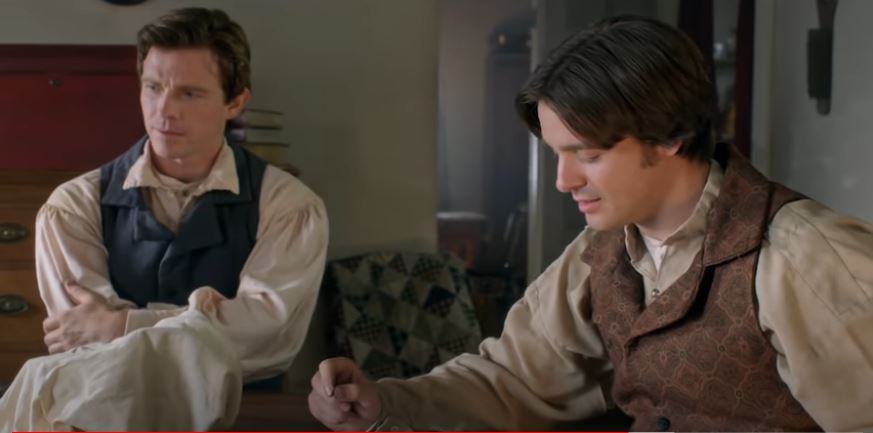
- That John the Baptist did not appear to Joseph and Oliver on the river bank, as is often depicted, but in a peaceful grove of maple trees some distance to the north, on the other side of Joseph’s home.

- That their baptism did not occur immediately, but “later in the day.”

- Mary Whitmer’s being shown the plates by Moroni even before the Three Witnesses saw them.
- The Spirit told David Whitmer he needed to finish his plowing, as his father desired, before leaving to get Joseph and Oliver from Harmony.
- Unseen beings plowing the Whitmers’ field so that David could leave earlier to get Joseph and Oliver
- Joseph’s not being able to translate at all after getting upset with Emma until he had apologized
- Following Joseph’s showing the plates to the Eight Witnesses, Moroni appeared and took the plates from him for the last time.
7. Who were David, John, and Peter Whitmer, Jr., and why would they have been selected to receive sections 14-16 of the Doctrine and Covenants?
David was a friend of Oliver Cowdery and had received enthusiastic reports from Oliver about the work he and Joseph were doing on the Book of Mormon. John and Peter were David’s brothers. At Oliver’s request, David went to Harmony, Pennsylvania, and took Oliver and Joseph to the Whitmer home in Fayette, New York, where with the generous support of the Whitmer family they could live free of charge and finish their work of translation. As the heading to D&C 14 indicates, these three Whitmer sons, “each having received a testimony as to the genuineness of the work, became deeply concerned over the matter of their individual duty.” Sections 14-16 “were given in answer to an inquiry through the Urim and Thummim.”
8. What does the Lord define as the greatest of all his prospective gifts to us, and where does he so define it? Why would He have singled that out as the greatest?
14:7—Eternal life. It’s the greatest both because of its duration and its quality. In its fullest sense, it means not simply to live forever (which is the meaning of “immortality”) but to live as God, or the Eternal One, lives, with the same joy, glory, and eternal opportunities. Nothing could possibly be greater.
9. How do you explain sections 15 and 16 being identical except for the name of the recipient, when patriarchs today are cautioned to take care not to give identical blessings to two individuals? (This is similar to a question we considered in a previous week’s study, so consider it a review question.)
Just like mission calls today from the president of the Church may have identical language, since it is equally applicable to many individuals, so could the Lord prompt Joseph Smith to use language in sections 15 and 16 which would fit Peter Whitmer just as well as it fit John.
10. Why do you suppose the Lord chose Martin Harris, Oliver Cowdery, and David Whitmer as the Three Witnesses of the Book of Mormon rather than someone else? Why was the call of each particularly appropriate?
These were three who had done much and sacrificed much to help bring forth the Book of Mormon. Martin was the first scribe and the one who sacrificed the most financially to publish the book. Oliver was the major scribe, from whose pen came 90% of the book as Joseph dictated it. David was the one who went to Harmony to take Joseph and Oliver to his father’s home, where the translation could be finished in peace. And the three of them specifically asked Joseph to enquire of the Lord if they might have the opportunity to be the three witnesses promised in the book itself, which Joseph did, resulting in D&C 17.
11. List four sacred artifacts the Three Witnesses saw in addition to the plates of the Book of Mormon.
The breastplate, sword of Laban, Urim and Thummim, and liahona. They also saw a table provided by Moroni, on which the artifacts lay.
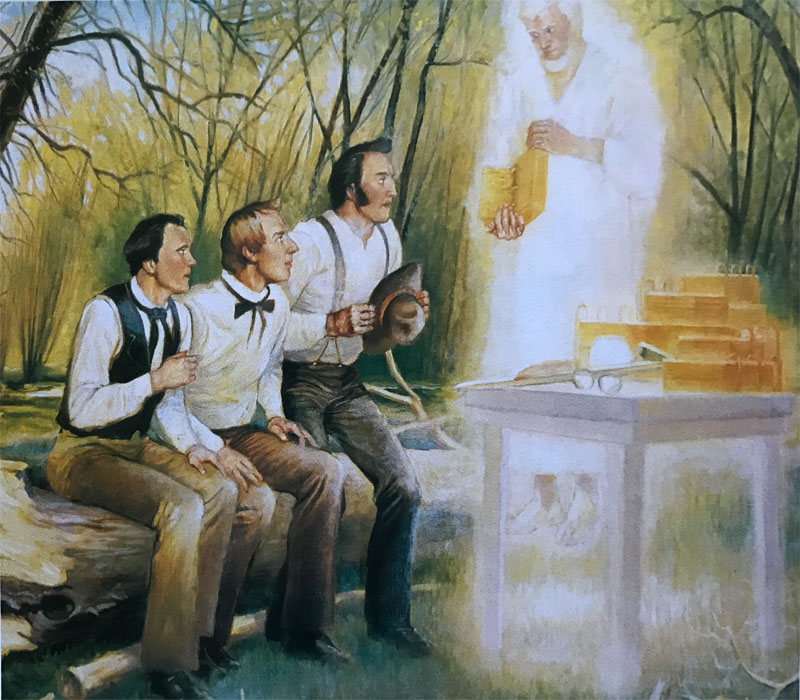
12. What personal application can you see of the principle behind the fact that Oliver Cowdery and David Whitmer couldn’t see the angel or the plates until Martin Harris left?
One out of tune individual can keep those around him from having desired spiritual experiences, whether in a class of youth, a sacrament meeting, family home evening, or the temple. We should therefore (a) try to make sure we are not the cause of others’ not feeling the Spirit and (b) if necessary, remove offenders from the setting.

13. Why could it be argued that the testimony of the Three Witnesses is even more compelling because they left the Church than it would have been had they not done so?
If they had been in collusion, certainly they would have been likely to have confessed after Joseph Smith expelled them from the Church, in order to get back at him. The fact that they didn’t do so, and that two of them came back into the Church later, is powerful evidence that they knew their testimony to be true and dared not deny it.
14. What were the major differences between the experience of the Three Witnesses and that of the Eight Witnesses? What did each have that the other did not?
The Three Witnesses
- Saw the angel, who brought the plates
- Saw other sacred artifacts
- Heard the voice of God testifying that the book was true
The Eight Witnesses
- Were shown the plates by Joseph Smith, with no accompanying vision or voice
- Were able to handle the plates, which the Three Witnesses did not
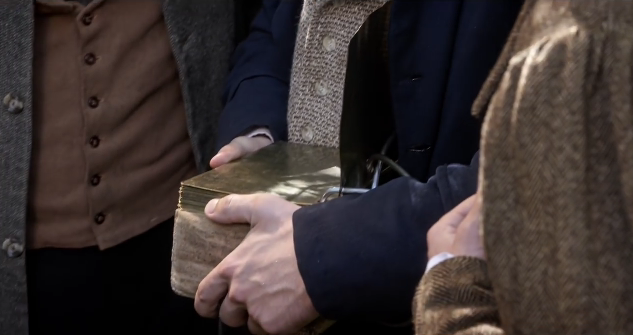
15. What effect would it likely have on the world’s attitude toward the Book of Mormon if Moroni had left the plates and other artifacts for Joseph Smith to display in a Church museum? Why do you think so?
According to 5:7 and Luke 16:31, none. The recovery of some of the Joseph Smith papyri has done nothing to persuade anyone that the Pearl of Great Price is true. If the plates were on display, people would argue either that Joseph Smith had had them made or that his translation was fabricated, since no modern scholars would be able to read the plates anyway.
